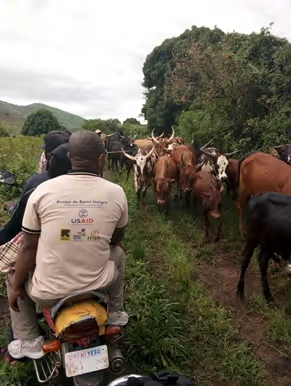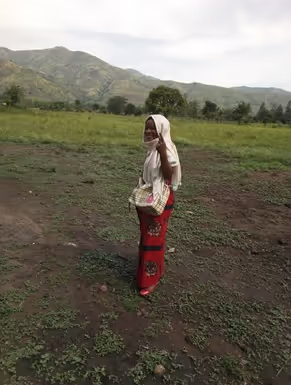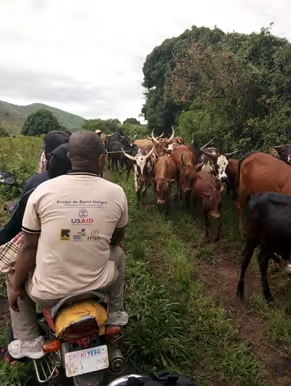My Success Story

My name is Ange, a 30-year-old woman. I was selected among researchers (data collectors) at the Institut Supérieur du Lac (ISL) on the impact of the Living Peace intervention. This research positively marked me.
It took place in specific villages where we have been sent in teams and worked there for about a Month in collecting data from participants.
In my team, we had many different fun experiences alongside our work. I remember, one of us who always went to the field with his little umbrella in his bag. He asked us to never panic in case we could be caught by the militia, because he had persuaded us that he had a weapon and only in case of danger; this weapon would serve to save us. One day there was a change of atmosphere, he did took out his umbrella and used it. When we checked in the bag, we realized that it was not a weapon, rather an umbrella. Everyone burst out laughing.
Also, we always use to take a picture of us all, researchers and facilitators before starting data collection in every village. One day we asked a young boy who was passing to take us a picture. Everyone being ready for the photo, one of the researchers said: be careful, be vigilant for this young man who is taking us a picture because he can get us lost with this tablet. And if it was your reaction? There, we all burst out laughing and the other friend of the umbrella reacted "no, otherwise I'm going to shoot him in his leg". A another one said "my dear, here I'll first forget everything I am and we're all going to follow him like chasing a chicken in the village before slaughtering it "And that joke came back every time we wanted to take a picture.

In addition to the experiences with my team, we have associated many families as participants in the research and we have learned a lot from them about their fascinating lives.
In this story; we are going to review one lady in KUNDI* village; one of the 60 villages in which the research is taking place.
We have been persuaded that the psychologist's interventions are not limited to the hospital, or other structure, but also, and most importantly, to the prevention of the onset of disorder, behavior disorder, because there are a number of attitudes or archaic behaviors that we adopt in ignorance and that over time could cause us harm.

To illustrate this, we report the following cases that, I and my team, investigated during our interviews and for the confidentiality reasons, I prefer to use the fictitious names.
She is BALU*, a 22 years old woman, living in free union with ZALU*, her husband. Mother of 3 children, BALU knew the first man of her life at the age of 14, and from there she was fat. When she gave birth, her husband ZALU took her for an object of sexual pleasure under the pretext that she had to get used to the female sexual organs and put them back in place, because they became dysfunctional at the time of delivery.
Six months later, BALU feels no sexual pleasure although she continues to give birth. What is striking in this story is during our interview, BALU reported that she feels guilty about her husband's disregard for her personality, sometimes when she begins to reflect on her life, she feels depressed and loose her smile, becomes anorexic and finds it difficult to find joy. Even where there is a party, BALU feels as if it is her who will ruin everything, given the negative consideration that her husband gives. She unites with her husband ZALU just to satisfy the sexual pleasure of him, otherwise for her, she has only dyspareunia (a painful sexual intercourse).

In view of all this, we find that there is a need to intervene for this family who lives the ignorance, and the intervention at this level would be as we can see, a psychic accompaniment, focused more on the couple.
In addition, this research has opened our eyes to the world of the psychology interventions. As to the difficulties of the field, with my team we hope to have done the best of ourselves and
I hope these experiences have inspired you as much as they inspired me living and sharing them with you.
*For the reasons of confidentiality, fictitious names were used for villages and participants names
Stay updated
Sign up for our newsletter to receive regular updates on resources, news, and insights like this. Don’t miss out on important information that can help you stay informed and engaged.
Related articles


.png)
Explore Elrha
Learn more about our mission, the organisations we support, and the resources we provide to drive research and innovation in humanitarian response.